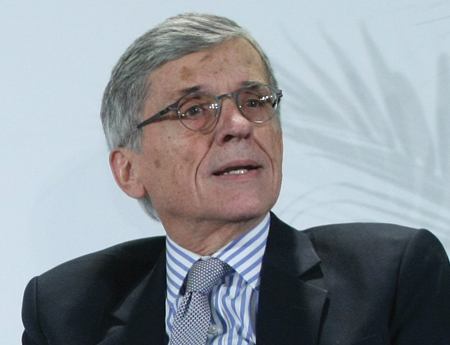State Legislatures to Wheeler: See You in Court

The smarter way to stay on top of broadcasting and cable industry. Sign up below
You are now subscribed
Your newsletter sign-up was successful
The National Conference of State Legislatures wrote FCC Chairman Tom Wheeler this week to say they would challenge the constitutionality of any attempt to preempt state laws restricting municipal broadband networks.
Wheeler has said those laws are attempts by ISP incumbents, including cable operators, to prevent competition and that he wants to use the FCC's authority to loosen "legal restrictions on the ability of cities and towns to offer broadband services to consumers in their communities."
"On behalf of the National Conference of State Legislatures (NCSL), we write to express our opposition to your recent remarks articulating your desire to preempt state laws regulating taxpayer-funded broadband networks," wrote Oregon State Senator Bruce Starr, President of NCSL, and Nevada State Senator Debbie Smith, president-elect. "NCSL will challenge the constitutionality of any action on the part of the Federal Communications Commission (FCC) seeking to diminish the duly adopted laws of the impacted states [there are 21 with such laws] or prevent additional states from exercising their well-established rights to govern in the best interests of the voters."
Pointing out that Wheeler himself has conceded there have been both successes and failures in community broadband, the NCSL leaders ask: "[I]s it that unreasonable policymakers in 21 states have responded by enacting safeguards on municipal networks to mitigate the pitfalls associated with entry?"
At a recent Hill hearing, Comcast EVP David Cohen said that while as a former city official he hated it when states tried to preempt municipal decisions, he did not agree with the feds preempting the states, either, and that Comcast's general position was that municipal broadband was not the best way to close the digital divide.
Some ISPs have worked at the state level to back laws limiting municipal broadband. Cohen says Comcast's style is to talk to officials about the downsides, like when Provo could not make a go of a municipal broadband net and taxpayers will be paying for that over 20 years while the city sold it to Google for a dollar.
Generally, cable operators don't want government money used to subsidize competitors, arguing that could drive them out of the market if they can't make a business case for pricing the service competitively against a subsidized entrant.
The smarter way to stay on top of broadcasting and cable industry. Sign up below
Contributing editor John Eggerton has been an editor and/or writer on media regulation, legislation and policy for over four decades, including covering the FCC, FTC, Congress, the major media trade associations, and the federal courts. In addition to Multichannel News and Broadcasting + Cable, his work has appeared in Radio World, TV Technology, TV Fax, This Week in Consumer Electronics, Variety and the Encyclopedia Britannica.

